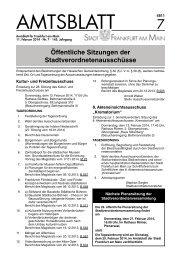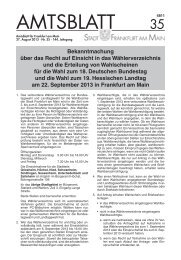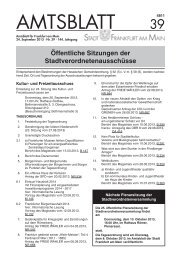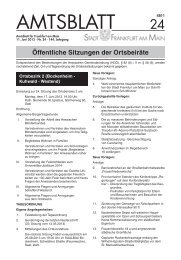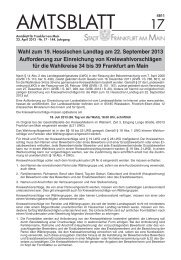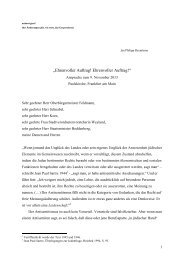Auftaktkonzert des 16. Festivals „Cuba im Film“ - Frankfurt am Main
Auftaktkonzert des 16. Festivals „Cuba im Film“ - Frankfurt am Main
Auftaktkonzert des 16. Festivals „Cuba im Film“ - Frankfurt am Main
Create successful ePaper yourself
Turn your PDF publications into a flip-book with our unique Google optimized e-Paper software.
Paula Alí betrat 1959 die Welt <strong>des</strong><br />
Showgeschäfts als Modell <strong>im</strong> Fernsehen.<br />
1965 erhielt sie als Autodidaktin ihr erstes<br />
Engagment <strong>im</strong> Teatro Martí, ein emblematischer<br />
Ort der cubanischen Kultur, der sich<br />
vor allem durch possenhafte Stücke renommierter<br />
Schauspieler einen N<strong>am</strong>en machte<br />
und sich an großer Beliebtheit aus der<br />
Bevölkerung erfreute.<br />
Seit 1970 ist Paula Alí <strong>im</strong> Teatro Estudio<br />
engagiert, vor einigen Jahren gesellte sich<br />
noch die Theatergruppe El Público um<br />
Carlos Díaz dazu. Eine enge Theater-<br />
Beziehung verband sie auch mit dem <strong>im</strong><br />
April 2011 verstorbenen Dr<strong>am</strong>aturgen und<br />
Cineasten Héctor Quintero.<br />
Neben dem Theater arbeitet sie auch <strong>im</strong><br />
Fernsehen, sie spielt in verschiedenen TV-<br />
Serien, in cubanischen Telenovelas und<br />
eroberte sich vor allem durch das humoristische<br />
Progr<strong>am</strong>m Punto G die Herzen aller<br />
Cubaner.<br />
Zum Kino gelangt sie in den 1980er<br />
Jahren mit Cartas del Parque von Tomás<br />
Gutiérrez Alea, und seitdem erhält sie<br />
Rollen in den renommiertesten Kinofilmen<br />
<strong>des</strong> Lan<strong>des</strong>, wie etwa Guantan<strong>am</strong>era<br />
(1995, Regisseur: Tomás Gutiérrez Alea),<br />
Amor Vertical (1997, Regisseur: Arturo<br />
Sotto), Lista de Espera (2000, Regisseur:<br />
Juan Carlos Tabío), Miel para Oshún (2001,<br />
Regisseur: Humberto Solás), Nada<br />
(Regisseur: Juan Carlos Cremata), El cuerno<br />
de la abundancia (2008, Regisseur: Juan<br />
Carlos Tabío) wie auch Lisanka (Regisseur:<br />
Daniel Díaz Torres) und Boleto al Paraíso<br />
(Regisseur: Gerardo Chijona).<br />
10<br />
Paula Alí se vinculó al mundo del espectáculo<br />
en 1959, cuando comenzó a trabajar<br />
como modelo en la televisión. En 1965<br />
pasó al Teatro Martí, lugar emblemático en<br />
la cultura cubana por el teatro vernáculo<br />
que allí se hacía, con f<strong>am</strong>osos actores del<br />
género bufo.<br />
En 1970 se integró al grupo Teatro<br />
Estudio, uno de los más prestigiosos del<br />
país, donde ha permanecido hasta la actualidad.<br />
T<strong>am</strong>bién ha colaborado con los grupos<br />
teatrales más <strong>im</strong>portantes de los últ<strong>im</strong>os<br />
veinte años, Teatro El Público, dirigido<br />
por Carlos Díaz. Sostuvo una larga <strong>am</strong>istad<br />
profesional con el dr<strong>am</strong>aturgo y cineasta<br />
Héctor Quintero, fallecido el pasado abril<br />
en La Habana. Paralel<strong>am</strong>ente ha actuado en<br />
numerosas telenovelas, teatros en televisión<br />
y otros seriados, como el popular progr<strong>am</strong>a<br />
humorístico Punto G.<br />
Al cine llega en los años ochenta, con<br />
Cartas del parque (1988, Dir. Tomás<br />
Gutiérrez Alea), y <strong>des</strong>de entonces ha actuado<br />
en algunas de las películas de más reputación<br />
en el país.<br />
Mirielys Cejas González, geboren 1988 in<br />
Havanna, Studium der Psychologie,<br />
Theatererfahrung als Schauspielerin be<strong>im</strong><br />
Argos Teatro in Havanna, erste Hauptrolle<br />
<strong>im</strong> Kino als Lisanka <strong>im</strong> gleichn<strong>am</strong>igen Film<br />
von D.D. Torres. Für Lisanka musste sie<br />
eigens Untericht in russischer Sprache nehmen<br />
sowie das Traktor fahren erlernen.<br />
2010 wurde sie für diese Rolle als beste<br />
weibliche Hauptdarstellerin be<strong>im</strong> Ibero<strong>am</strong>erikanischen<br />
Festival in Ceara, Brasilien,<br />
ausgezeichnet.<br />
Be<strong>im</strong> Festival Cuba <strong>im</strong> Film präsentiert<br />
Mirielys Cejas Boleto al Paraíso von G.<br />
Chijona, in dem sie als Eunice ihre zweite<br />
Hauptrolle spielt. „Mirielys Cejas übertrifft<br />
als ernsthafte Darstellerin alle Erwartungen.<br />
Ihr Blick, ihr Zittern und ihre Verzagtheiten<br />
bereichern subtil und gleichzeitig<br />
mit erstaunlicher Kraft einen Film, den sie<br />
von der ersten bis zur letzten Einstellung<br />
trägt. Bemerkenswert ist die Schlusssequenz,<br />
in der sie ganz ohne Worte aber<br />
vielsagend die Dr<strong>am</strong>atik und Emotion vermittelt,<br />
die der Film hier ansonsten zu vermeiden<br />
sucht“ (Filmkritiker Joel del Rio in<br />
„Juventud Rebelde“, 2.4.2011).<br />
Mirielys Cejas lebt in Havanna.<br />
Nacido 1988 en La Habana. Estudió psicología<br />
en La Habana. Reunió experiencia<br />
como actriz de teatro en la compañia<br />
ARGOS TEATRO de La Habana. Lisanka es su<br />
debut profesional como actriz de cine. Tuvo<br />
que aprender el ruso y tuvo que aprender a<br />
manejar un tractor para poder <strong>des</strong>empeñar<br />
mejor su rol: Lisanka como agricultora,<br />
convirtiéndose en la pr<strong>im</strong>era mujer tractorista<br />
de la Isla. Obtuvo el premio a la Mejor<br />
Actuación Femenina (en Lisanka) en el 20<br />
Festival Ibero<strong>am</strong>ericano de Cine de Ceará,<br />
Brasil, 2010.<br />
En el Festival de Cine Cubano va a presentar<br />
Boleto al Paraíso, filme del realizador<br />
Gerardo Chijona. „Por su parte, Miriel<br />
Cejas acaba de rebasar la categoría de promesa<br />
para convertirse en una actriz sólida.<br />
Su mirada líquida, sus temblores y apoc<strong>am</strong>ientos<br />
enriquecen con sutileza y sorprendente<br />
potestad un filme que ella se echa en<br />
la espalda <strong>des</strong>de el pr<strong>im</strong>erís<strong>im</strong>o plano del<br />
inicio hasta su homólogo del final.<br />
Elocuente resulta este plano final cuando,<br />
sin una sola palabra, la muchacha consigue<br />
transmitir muchas de las emociones y<br />
momentos dr<strong>am</strong>áticos que la película, por<br />
cierto, decidió excluir en su recta final“<br />
(Joel del Río en „Juventud Rebelde“, 2 de<br />
Abril del 2011 ).<br />
Mirielys Cejas vive en la Habana.<br />
11





